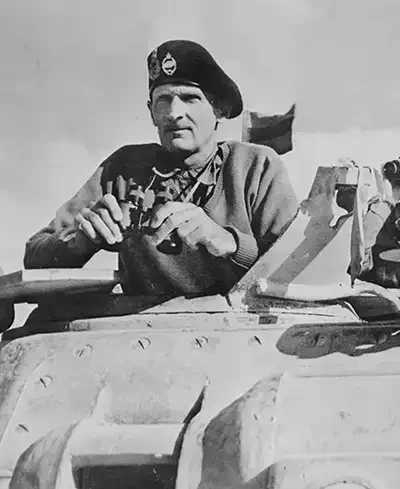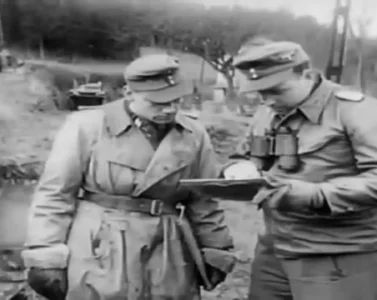- Military History
- Biographies
- Militarians Biographies
- Field Marshal Bernard Montgomery
Field Marshal Bernard Montgomery
One of the greatest British general of the 20th century, but also one who notoriously lacked tact and diplomacy throughout his career
Bernard Law Montgomery, the outstanding British commander during WW II famous for his victory at the Battle of El Alamein in November 1942 and his role in allied campaigns leading to the German surrender, was born on November 17, 1887 in London’s district Kennington. He spent most of his early childhood in Tasmania, then still a British colony, where his father worked as Ulster clergyman.
When the family returned to England for good in 1901, Montgomery attended St. Paul’s School in London and later continued his education at the Royal Military College in Sandhurst. He was commissioned into the 1st Battalion of the Royal Warwickshire Regiment as a Second Lieutenant in 1908 and later that year served in India.
In 1910 he was promoted to lieutenant and two years later he became an adjutant of the 1st Battalion of his regiment at Shorncliffe Army Camp.
When WW I broke out, Montgomery was sent with his battalion, which was at the time part of the 10th Brigade of the 4th Division, to France. But only 2 months into the war, he was severely wounded and spent the rest of the war as staff officer.
During the interwar years, Montgomery graduated from Staff College in Camberley, served in Ireland. Egypt, British India and British-held Palestine.
When Britain entered WW II in September 1939, Montgomery was a Major General and commanded the 3rd Division as part of the British Expeditionary Forces (BEF) in France. When the German invasion forced the allied troops back to the sea in 1940, he withdrew his men with great professionalism to Dunkirk and evacuated the 3rd Division to Britain with minimal losses. Being in command of the southeastern section of England, Montgomery began a rigorous program of intensive training for his men, aimed at turning them into troops that could meet and defeat their German counterparts.
In August 1942, Prime Minister Winston Churchill selected Montgomery to take command of the British 8th Army in North Africa, which had recently been defeated by German troops under General Rommel at Tobruk and pushed back to Egypt. Montgomery remained on the defensive at first. But giving his men their confidence back, he built up a formidable strike force in Egypt. After Rommel's attacks failed to penetrate the British perimeter, Montgomery went on the offensive. The resulting Battle of El Alamein (October 1942) was the first major loss in the field inflicted on the Germans during the war. He then pursued the Germans across North Africa until their final surrender in Tunisia in May 1943. Montgomery's meticulous preparation and execution in North Africa earned him a promotion to Full General.
Montgomery led his 8th Army in the Allied invasion of Sicily in 1943 and up the east coast of Italy until being called back home. He was selected as the ground commander of the Allied invasion force in France, but the position of supreme commander went to US General Dwight D. Eisenhower. At first, the allied units that landed in Normandy on D-Day (June 6, 1944) made slow progress. Feelings of resentment grew between Montgomery and some of the allied commanders, notably US General George Patton. Montgomery's planning went awry at the Battle of Arnhem in September, where six thousand airborne troops were lost. Having been criticized for this loss, Montgomery spared no opportunity to chastise the Americans for their initial defeats in the Battle of the Bulge (December 1944).
Promoted to Field Marshal, Montgomery finally led his men to victory across northern France, Belgium, the Netherlands and northern Germany, receiving the surrender of the northern German troops on May 4, 1945.
When the war ended, Montgomery was made a Knight of the Garter and Commander-in-Chief of the British Army of the Rhine. In 1946, he became the 1st Viscount of Alamein and served as Chief of the Imperial General Staff until 1948. He became chairman of the Western Union Defence Organization (1948–51) and later served as a deputy commander under Eisenhower (and his successors) at the North Atlantic Treaty Organization, Supreme Headquarters, Allied Powers in Europe (1951–58). Among many theoretical and historical papers on warfare, he wrote his controversial Memoirs (1958) and The Path to Leadership (1961).
Bernard Montgomery, certainly the greatest British general of the 20th century, but also one who notoriously lacked tact and diplomacy throughout his career, died on March 24, 1976, aged 88 at his home Isington Mill near Alton, Hampshire, England. His remains were laid to rest at the Holy Cross churchyard in Binsted, Hampshire.
Field Marshal Bernard Montgomery - Quick Facts
- 21st Army Group (British Army 1943-1945)
- 3rd Infantry Division (British Army - since 1809)
- 8th Army (British Army 1919-1994)
- 8th Infantry Division (British Army 1914-1940)
- 9th Infantry Brigade (British Army 1914-1945)
- British Army
- Chief of the Imperial General Staff
- Deputy Supreme Allied Commander Europe
- II Corps (British Army)
- V Corps (British Army)
- XII Corps (British Army 1915-1945)
- WWI (1914-1918)
- Anglo-Irish War - Irish War of Independence (1919-1921)
- WWII (1939-1945)
- {{#owner}}
- {{#url}} {{#avatarSrc}}
{{name}} {{/url}} {{^url}} {{#avatar}} {{& avatar}} {{/avatar}} {{name}} {{/url}} - {{/owner}} {{#created}}
- {{created}} {{/created}}
























